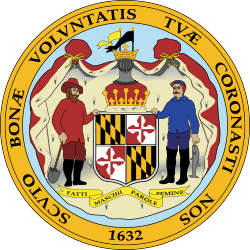| Elections in Maryland |
|---|
 |
Maryland held its elections October 1, 1810.
| District | Incumbent | This race | |||
|---|---|---|---|---|---|
| Representative | Party | First elected | Results | Candidates [a] | |
| Maryland 1 [1] | John Campbell | Federalist | 1801 | Incumbent retired. New member elected. Federalist hold. | √ Philip Stuart (Federalist) 98.3% John Parnham (Democratic-Republican) 1.1% |
| Maryland 2 [2] | Archibald Van Horne | Democratic-Republican | 1806 | Incumbent retired. New member elected. Democratic-Republican hold. | √ Joseph Kent (Democratic-Republican) 56.4% John F. Mercer (Federalist) 43.6% |
| Maryland 3 [3] | Philip Barton Key | Federalist | 1806 | Incumbent re-elected. | √ Philip Barton Key (Federalist) 100% |
| Maryland 4 [4] | Roger Nelson | Democratic-Republican | 1804 (Special) | Incumbent resigned May 14, 1810 to become associate judge of the fifth judicial circuit of Maryland. New member elected. Democratic-Republican hold. Successor also elected to finish the current term. | √ Samuel Ringgold (Democratic-Republican) 95.7% Benjamin Galloway (Federalist) 2.0% |
| Maryland 5 Plural district with 2 seats [5] | Nicholas R. Moore | Democratic-Republican | 1803 | Incumbent lost re-election. New member elected. Democratic-Republican hold. | √ Alexander McKim (Democratic-Republican) 27.7% √ Peter Little (Democratic-Republican) 25.7% Nicholas R. Moore (Democratic-Republican) 24.4% Joshua Barney (Democratic-Republican) 22.2% |
| Alexander McKim | Democratic-Republican | 1808 | Incumbent re-elected. | ||
| Maryland 6 [6] | John Montgomery | Democratic-Republican | 1806 | Incumbent re-elected. | √ John Montgomery (Democratic-Republican) 98.1% Thomas G. Moffit 1.7% |
| Maryland 7 [7] | John Brown | Democratic-Republican | 1808 | Incumbent re-elected but declined the seat and resigned, leading to a special election. | √ John Brown (Democratic-Republican) 99.7% |
| Maryland 8 [8] | Charles Goldsborough | Federalist | 1804 | Incumbent re-elected. | √ Charles Goldsborough (Federalist) 72.3% Thomas Williams (Democratic-Republican) 27.5% |